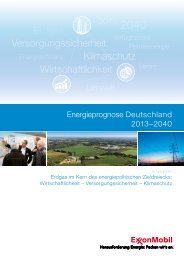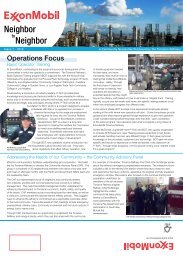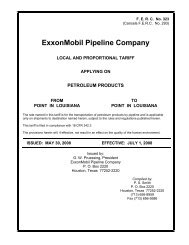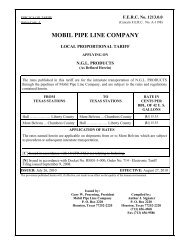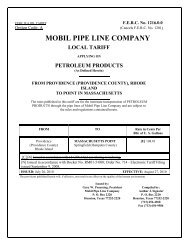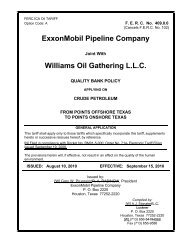ExxonMobil and Abu Dhabi
ExxonMobil and Abu Dhabi
ExxonMobil and Abu Dhabi
You also want an ePaper? Increase the reach of your titles
YUMPU automatically turns print PDFs into web optimized ePapers that Google loves.
Viewpoint<br />
1<br />
Power<br />
Transportation<br />
Residential/<br />
Commercial<br />
Industry<br />
Energy saved<br />
through industrial<br />
efficiency gains<br />
Industrial evolution<br />
New technologies can help businesses<br />
become more energy-efficient.<br />
0 25 50 75 100 125<br />
Million barrels daily oil-equivalent<br />
If you drive a fuel-efficient car, you are helping<br />
the environment by conserving natural<br />
resources <strong>and</strong> reducing emissions of carbon<br />
dioxide (CO2) <strong>and</strong> other greenhouse gases.<br />
But what about the energy it took to produce<br />
the fuel <strong>and</strong> the other products we<br />
use? Can efficiency help there, too?<br />
The answer is yes. Businesses are major<br />
consumers of energy. In creating <strong>and</strong> delivering<br />
the goods <strong>and</strong> services we depend<br />
upon, they use large quantities of electric<br />
power <strong>and</strong> other energy sources. For example,<br />
the industrial sector alone accounts for<br />
about one-third of total energy consumption<br />
worldwide <strong>and</strong> more than 25 percent of<br />
energy-related CO2 emissions.<br />
By improving energy efficiency, <strong>and</strong> taking<br />
advantage of advanced efficiency technologies,<br />
industries have a tremendous opportunity<br />
to contribute to the global effort to<br />
reduce greenhouse gas emissions.<br />
At <strong>ExxonMobil</strong>, our high-efficiency cogeneration<br />
facilities throughout 10 U.S. sites<br />
generate up to 2,400 megawatts of electricity,<br />
while also producing steam <strong>and</strong> useful<br />
heat needed for industrial processes. At our<br />
refinery in Beaumont, Texas, one cogeneration<br />
plant – our largest worldwide – can<br />
produce about 500 megawatts of electricity,<br />
which not only powers refining operations<br />
but also supplements the local power grid.<br />
We have invested more than $600 million<br />
Estimated 2030<br />
world primary<br />
energy dem<strong>and</strong><br />
by sector<br />
in U.S. cogeneration facilities commissioned<br />
since 2004. When combined with our global<br />
cogeneration capacity, these investments<br />
have helped reduce global greenhouse gas<br />
emissions equivalent to taking more than<br />
1 million cars off U.S. roads.<br />
Clearly, increased energy efficiency<br />
is good for the environment. But it also<br />
enhances the global business environment.<br />
Companies can reduce costs, increase<br />
productivity <strong>and</strong> benefit shareholders by<br />
using advanced technology to make their<br />
operations more energy-efficient – a valuable<br />
asset during challenging economic times.<br />
The International Energy Agency calls<br />
efficiency a “triple win” solution – boosting<br />
economic performance, strengthening<br />
energy security <strong>and</strong> reducing greenhouse<br />
gas emissions.<br />
We agree. <strong>ExxonMobil</strong> has systematically<br />
worked to improve efficiency at our global<br />
operations, <strong>and</strong> we are making large investments<br />
in research <strong>and</strong> development of technologies<br />
that can advance the efficiency of<br />
how we produce energy <strong>and</strong> how consumers<br />
use our products.<br />
Today, companies <strong>and</strong> nations are being<br />
challenged to find creative ways to restore<br />
economic growth while protecting the environment.<br />
Investing in energy efficiency can<br />
help accomplish both.




